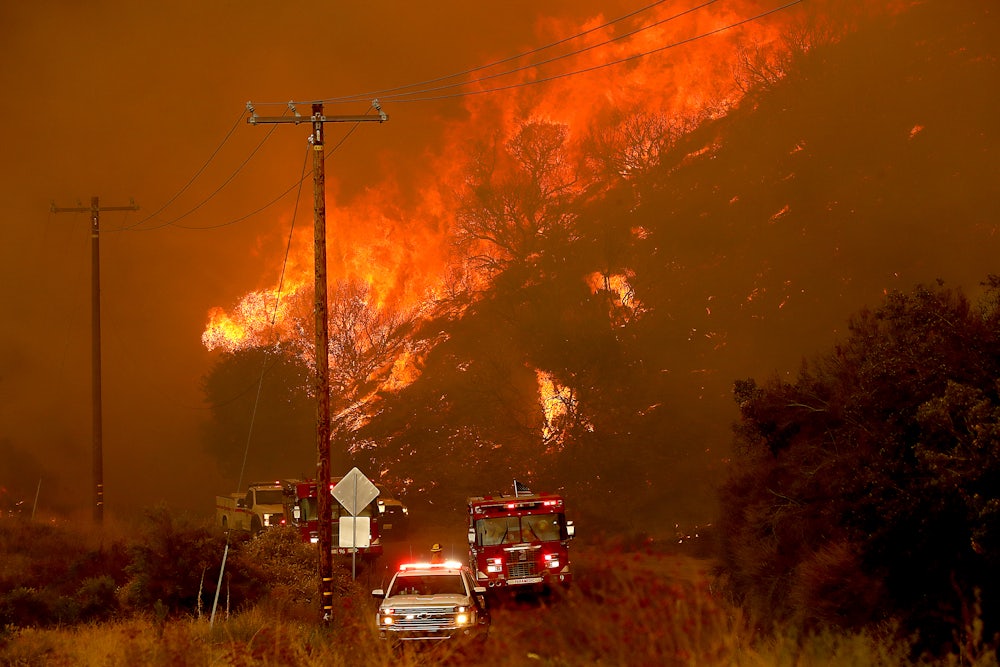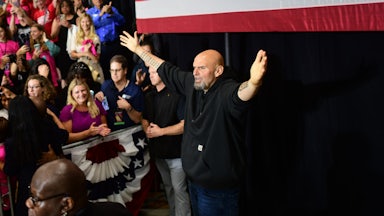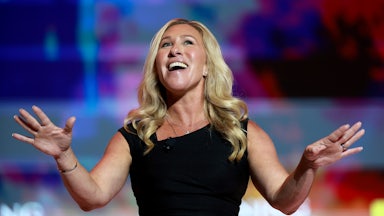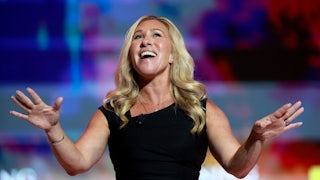Voters, allegedly, don’t want to hear about climate change. Eighty-two percent of Americans see inflation as “extremely or very important,” a new Monmouth University poll finds. Just 49 percent assigned similar importance to climate change, which ranked tenth on a list of 12 priorities for midterm voters. A survey published by the Yale Program on Climate Change Communication in July found that voters ranked climate change twenty-fourth on a list of 29 issues they considered most important in heading to the polls for the midterms.
“Americans these days—and particularly the swing voters who are being watched and courted so assiduously—are underwhelmed by abstract ideas, faraway crises or problems scheduled to materialize sometime in the future,” Los Angeles Times columnist Nicholas Goldberg wrote in response to those numbers. “With some exceptions, they’re focused on the here and now. Pocketbook issues. Quality-of-life issues. Better schools. Safer streets. The cost of living.”
It’s a familiar story: When times are tough people don’t want to hear about esoteric concerns. They want their lives to get better and for politicians to focus on kitchen-table issues.
But what if your kitchen table has just been washed out to sea?
It’s a little odd to talk about global warming—meaning unalterable changes to our physical reality—as if it’s somehow less concrete than other electoral issues. Rates of inflation and crime—now voters’ top concerns, per the Monmouth poll—can go up and down. Once greenhouse gases enter the atmosphere, they remain stubbornly hard to pull back down. Reversing their gargantuan impact on our world is impossible. The permanence of global warming alone should set it apart from everything else.
What does, admittedly, make things tricky is that climate crisis is less an issue than a context. Climate change floods, parches, and burns the ground on which politics happen.
Democrats in recent years have tried to nestle climate into other issues. The pitch is to associate a government doing something about climate change with good things for you and yours. Cabinet officials, for instance, have been popping up at car factories and other workplaces of the future to advertise the economic benefits of the Inflation Reduction Act’s forthcoming investments in clean energy. “By mobilizing private capital, the clean energy tax credits implemented by Treasury will propel our economy and workers to a leadership position in the fastest-growing markets and technologies of today and the future,” Treasury Secretary Janet Yellen said in a recent speech about the economy at a Ford plant in Dearborn, Michigan. “This includes the U.S. clean vehicle sector, where we can expect greater investment—and more good jobs, like the ones here at Ford—as we develop the supply chain here at home.”
That’s all well and good: Fighting climate change will create lots of jobs, which are things voters seem to like. That was the basic political argument of the Green New Deal—one Team Biden leaned on heavily in crafting its Build Back Better Agenda. This White House has also gone further than any of its predecessors in treating climate change as a problem that the whole government needs to understand and tackle. There’s plenty to be proud of and pitch to climate-weary voters ahead of the midterms. Toward that end, the League of Conservation Voters Victory Fund and the Climate Power Action Fund are mounting a $12 million, 17-state advertising blitz to spread the good news about the IRA.
Yet as November approaches, the Democratic Party’s leading voices have de-emphasized climate change as such on the campaign trail, emphasizing the apocalyptic world that a Congress controlled by Trumpist Republicans could bring about and trying to boost lagging confidence in President Biden’s handling of the economy. Pursuant to that goal, the White House lashed out at this week’s decision by OPEC Plus—a cartel of oil producers—to cut production, which is expected to drive up gas prices at home and abroad. In a joint statement, national security adviser Jake Sullivan and National Economic Council director Brian Deese made clear they were committed to a single goal: making gas cheaper—or, in Beltway speak, working to “protect American consumers and promote energy security.”
There is no issue U.S. politicians care more about than prices at the pump, especially in an election year. And there is probably no commodity as important as oil in deciding whether and how fast the world staves off climate change. For political expediency—and to appease donors—Democrats since Jimmy Carter have tried to convince themselves and the public that there is no contradiction between protecting the environment and keeping fossil fuel prices perennially low via boosting domestic fossil fuel production. That’s not true: Fossil fuel production needs to decline rapidly in order to keep global warming even remotely in check.
But maintaining that lie has also hobbled the party’s ability to talk about an issue that should theoretically be a slam dunk for them—particularly in a year when climate-fueled disasters have blanketed the country. Seventy-seven percent of the 71 percent of Americans who have experienced extreme weather of one kind or another think it had something to do with climate change. Fifty-three percent of of Americans think protecting the environment should be prioritized over economic growth, even if growth suffers as a result. Voters trust Democrats more to do something about climate change. It’s not hard to see why: The GOP party line is to proudly make the problem worse.
Weather isn’t an organizer, though. There’s no linear path between someone losing their home to rising seas—and seeing that as a consequence of climate change—and voting for Democrats. As overhyped and grating as the consult cottage industry of climate communications is, there’s some truth to the idea that people tend to like stories. And narratives can be useful in dealing with something as all-encompassing as a warming planet. In telling the story of the climate crisis primarily as one of heroic solutions (electric vehicles, solar power, wind, etc.), Democratic leaders have been reluctant to name enemies in the fight against it: from fossil fuel executives to the Republican politicians who do their bidding. With climate disasters mounting, giving people somewhere to direct their rage about fires and floods could come in handy.










